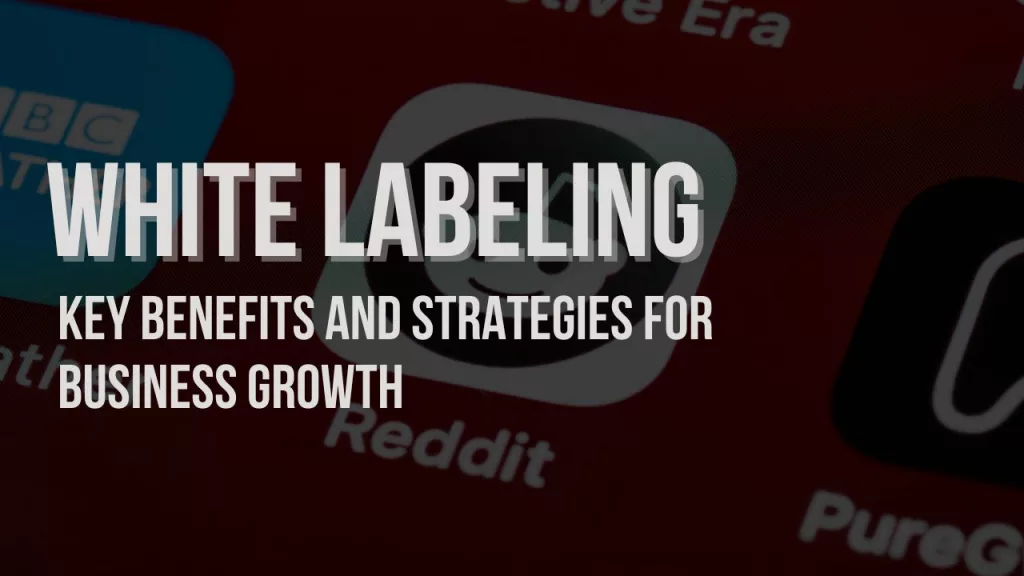Hello business leaders and entrepreneurs!
Are you seeking innovative ways to expand your business in 2024? Have you considered the dynamic world of white labeling as a growth strategy? If these questions resonate with you, you’re in the right place.

Now while business agility and innovation are paramount, white labeling emerges as a strategic cornerstone for growth and diversification. As 2024 unfolds, the landscape of white labeling has evolved, offering businesses enormous opportunities to expand their offerings, enhance brand presence, and streamline operations. In this blog I will look into the essence of white labeling, uncovering its benefits and strategic approaches that businesses can leverage for growth and success in today’s competitive market.
Also Read: Emerging Technologies To Strengthen Sales Pipeline
What is White Labeling?
White labeling refers to the practice of rebranding and selling products or services produced by one company under another company’s brand. This model enables businesses to offer a range of products without investing in manufacturing or development. The concept isn’t new, but its adoption and significance have grown substantially in the digital age, particularly in sectors like software, consumer goods, and digital marketing services.
Tracing its roots back to the manufacturing sector, where it was common place for companies to produce generic products for branding by retailers, white labeling has witnessed a significant transformation. With the advent of digital technologies and e-commerce, the scope of white labeling has expanded beyond physical goods to include software and digital services.
In 2024, this trend has further escalated with the integration of advanced technologies such as AI, IoT, and cloud computing, making white labeling more efficient and accessible across diverse industries.
Key Benefits of White Labeling for Businesses
White labeling can be a game-changer for your business, offering benefits that are both powerful and practical. Let’s take a look at the top advantages it brings to the table:
1. Cost Efficiency
One of the most compelling advantages of white labeling is cost efficiency. By adopting white label products, businesses can bypass the expensive and time-consuming process of product development. This approach significantly reduces overhead costs associated with research, development, and manufacturing. For startups and small businesses, this means a lower barrier to entry in competitive markets.
2. Focus on Core Competencies
White labeling allows companies to focus on their core competencies, such as marketing, customer service, and brand development, rather than spreading resources thin over product development and manufacturing. This strategic focus can lead to better overall performance and growth, as businesses can allocate more resources to areas where they excel.
3. Brand Building and Market Expansion
White labeling offers an expedited route to market expansion and brand building. Companies can quickly add new products to their portfolio, enhancing their brand’s perceived value and market presence. This strategy is particularly effective for businesses looking to diversify their offerings and reach new customer segments.
4. Rapid Deployment and Scalability
The agility provided by white labeling is unparalleled. Businesses can rapidly deploy new products to the market, responding quickly to changing consumer demands and trends. This flexibility is vital in a fast-paced market environment like 2024, where consumer preferences and technological advancements evolve rapidly. Moreover, scalability is inherently built into the white label model, allowing businesses to scale up or down based on market demand without significant investments or risks.
Also read: Top Digital Transformation Companies: Digital Game-Changers
Strategies for Implementing White Labeling in 2024
Let’s understand the essential strategies for effectively implementing white labeling in your business model. This approach not only simplifies the process but also maximizes the potential for success.
1. Identifying the Right Products or Services
In 2024, the key to successful white labeling lies in identifying products or services that align with your brand values and meet market demands. Analyzing market trends, understanding customer preferences, and identifying gaps in the current offerings are crucial steps. It’s also vital to consider the compatibility of the white label products with your existing portfolio to ensure a cohesive brand experience.
2. Choosing the Right Partners
Selecting the right white label partner is critical. Look for partners with a proven track record, reliable supply chains, and quality assurance processes. Compatibility in business values and goals is also essential for a long-term, fruitful relationship. Conducting thorough due diligence, including reviewing customer feedback and assessing their technological capabilities, is crucial in making an informed decision.
3. Marketing and Branding Strategies
Marketing and branding are the lifeblood of white labeling. In 2024, this involves more than just slapping your logo on a product; it’s about creating a brand story and experience that resonates with your target audience. Utilize digital marketing strategies like SEO, content marketing, and social media engagement to promote your white label products. Tailoring your marketing efforts to address the specific needs and preferences of your target demographic is key to driving sales and building brand loyalty.
4. Leveraging Technology and Trends in 2024
Staying abreast of technological advancements and market trends is crucial. This includes adopting e-commerce platforms that offer a seamless shopping experience, utilizing data analytics for market insights, and embracing emerging trends such as sustainability and personalization. Additionally, the integration of AI for customer service, predictive analytics, and automated marketing can significantly enhance efficiency and customer engagement.
Also read: Exclusive! Top White Label Crypto Exchange Companies
Future of White Labeling: Predictions and Trends
Emerging Technologies Impacting White Labeling
As we look towards the future, emerging technologies are set to revolutionize the white labeling landscape. Artificial Intelligence (AI) and Machine Learning (ML) are at the forefront, offering predictive analytics and personalized customer experiences. These technologies enable white label products to be more responsive to consumer needs and market trends. Additionally, blockchain technology is expected to play a significant role in ensuring transparency and security in white label supply chains, enhancing trust among businesses and consumers.
Market Predictions for the Next Five Years
The market for white label products and services is predicted to grow significantly in the next five years. This growth will be driven by the increasing demand for customized, on-demand products and services, especially in sectors like e-commerce, fintech, and digital marketing. As consumer preferences continue to shift towards personalized experiences, white labeling offers an effective way for businesses to adapt quickly to these changes.
Another trend likely to gain momentum is the integration of sustainability practices in white labeling. As environmental concerns become more pressing, businesses will seek white label partners who prioritize eco-friendly production methods and sustainable supply chains. This shift is not only ethically important but is also becoming a key factor in consumer decision-making.
Final Thoughts
White labeling presents a dynamic and versatile strategy for business growth in 2024 and beyond. Its ability to offer cost efficiency, market agility, and brand expansion opportunities makes it a compelling choice for businesses looking to stay competitive in a rapidly evolving marketplace. By understanding and implementing effective white labeling strategies, businesses can unlock new avenues for growth and success. As we look to the future, staying attuned to emerging technologies and market trends will be crucial for maximizing the benefits of white labeling.





[…] Also read: White Labeling Is A Highly Effective Marketing Tool For Your Business […]
[…] You might know: White Labeling: Key Benefits and Strategies for Business Growth […]
[…] Also read: White Labeling: Key Benefits and Strategies for Business Growth […]